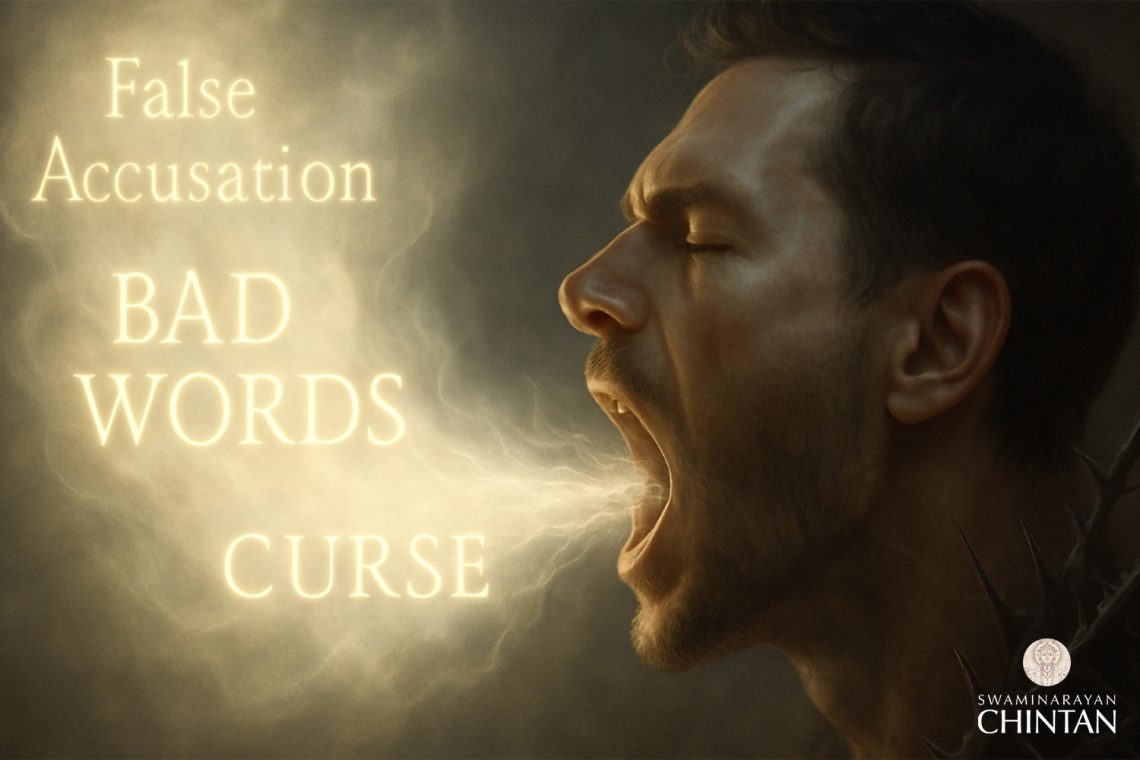मिथ्यापवाद: कस्मिंश्चिदपि स्वार्थस्य सिद्धये ।
नारोप्यो नापशब्दाश्च भाषणीया: कदाचन ।।२०।।
None shall ever make false accusations against anyone, even for serving self-interest, and one shall never abuse anyone.
This verse underscores the importance of speech and the moral responsibility to uphold the truth. Authored by Bhagwan Swaminarayan, the Shikshapatri guides devotees towards ethical living. This shlok explicitly prohibits two sins—false accusation and verbal abuse, each carrying heavy spiritual and worldly consequences.
In the digital age, where talks and gossip spread in seconds, this teaching is more critical than ever. One careless tweet or post, or rumour, can destroy reputations. Such misuse of speech not only harms others but also harms the speaker’s soul, breaking down the way to their spiritual journey.
False Accusation vs Theft: A Spiritual Comparison
While both are sins, false accusation is more brutal than theft. Theft is a material offence—one that can be rectified by returning goods or apologising. False accusation, however, destroys reputations in the mind of that person on whom you put false accusation and mental peace— spiritual injuries are far deeper and often irreversible.
Imagine being wrongly blamed for a theft. Even if proven innocent, the stain often remains in people’s minds. And worse, the accuser not only commits a lie but shoulders the karma of the accused’s imagined crime. It’s like stealing someone’s dignity.
Emotionally, false accusations inflict humiliation, stress, and depression. Socially, they isolate the victim. Spiritually, the damage is immense. Scriptures like Aditya Puran and Yagnavalkya Smriti affirm that falsely accusing an innocent person results in the transference of their sins to the person who puts false accusations.
Consequences in Spiritual and Real Life
Brutal Punishment
False accusations don’t just stay with the individual. Their ripple effect extends to family, livelihood, and even nature. It’s said that if a falsely accused person drops a tear in pain, the accuser’s household will suffer—business losses, animal illness, crop failure, and family problems.
Spiritual Regression
False speech creates a spiritual block. Those on the path to moksha are derailed by such actions. Especially if the accused is spiritually evolved, the accuser earns the compounded sin of lying and desecrating purity.
The Power of Speech: Blessing or Curse
Words are powerful—they can heal or destroy. Shikshapatri Shlok 20 clearly warns against verbal abuse. Scriptures say that those who speak abusively or lie are reborn as animals like deer or birds—symbols of fear and vulnerability.
Gossip and public shaming, even if based on truth, are equally dangerous. Exposing someone’s faults in public, when they’re not widely known, is again a sin. Mahabharata teaches that words must be measured, compassionate, and used for healing, not humiliation.
When Mistakes Are Made
Everyone makes mistakes. But if you realise you’ve falsely accused or spread a rumour unintentionally, seek forgiveness. Confess to the affected person, correct your mistake publicly if needed, and if possible, consult a saint.
Why False Accusation is a Heavier Sin than Theft
Here’s a clear comparison:
| Aspect | Theft | False Accusation |
| Harm | Material loss | Emotional and reputational damage |
| Rectification | Return the item, apologize | Nearly impossible to restore trust |
| Spiritual Burden | Personal sin | Double sin may inherit the accused’s karma |
| Broader Consequence | Individual Impact | Affects family, community and future |
| Obstacle to Liberation | Present but recoverable | Major Block to spiritual ascent |
This comparison shows that while theft harms the body, false accusation wounds the soul. And in spiritual terms, the latter is far more severe.
How to Speak with Righteousness
To avoid these sins, follow these principles:
- Pause Before You Speak: Ask if your words may cause harm.
- Verify Before You Share: Never pass along unconfirmed stories.
- Practice Silence: If unsure, it’s better to remain quiet.
- Reflect Daily: Assess if your words helped or hurt others.
- Apologise and Atone: If wrong, admit it and make amends.
By adopting these habits, your speech becomes a tool of light, not darkness.
Conclusion
Shikshapatri Shlok 20 reminds us that speech is sacred. False accusations and verbal abuse don’t just hurt others—they damage your soul, derail your spiritual path, and invite suffering into your life. Worse than theft, such sins fracture lives and spread darkness, yet the door to forgiveness is always open. With genuine remorse, clear action, and a commitment to truth, one can restore harmony. Let your words become seeds of healing, not weapons of destruction. Speak not to wound, but to uplift.

